Prior to the start of the 2017-18 regular season, there are many inquiries regarding the Chicago Blackhawks—a roster and organization that has been absolutely engulfed in salary-cap struggles over recent years.
And to make matters worse, they have an embarrassing, ignominious playoff defeat lingering over their organization—a unique, but utterly disappointing turn of events for a team that has more often been on the other side of such losses.
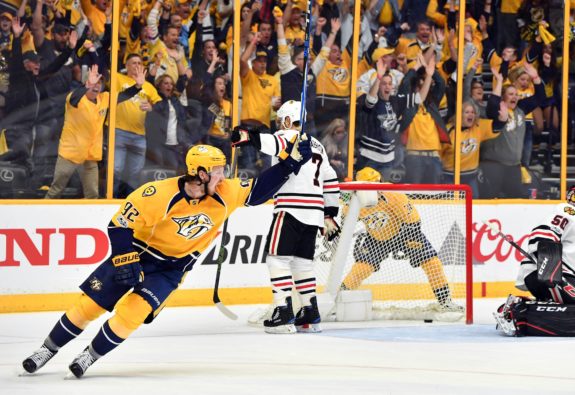
But it’s a new season and thus a clean slate for the organization. To combat the playoff loss suffered at the hands of the Nashville Predators last April, Blackhawks general manager Stan Bowman re-acquired Brandon Saad, signed Patrick Sharp and traded for defenseman Connor Murphy—a deal which also brought goaltender Anton Forsberg to the Windy City.
The Blackhawks’ insertion of notable young talent that began last season will only intensify and progress heading into 2017-18. We were able to ascertain how Nick Schmaltz and Ryan Hartman would adjust to the fast-paced, highly-intense action that we’ve all come to know and love from the NHL, and they displayed many propitious signs.
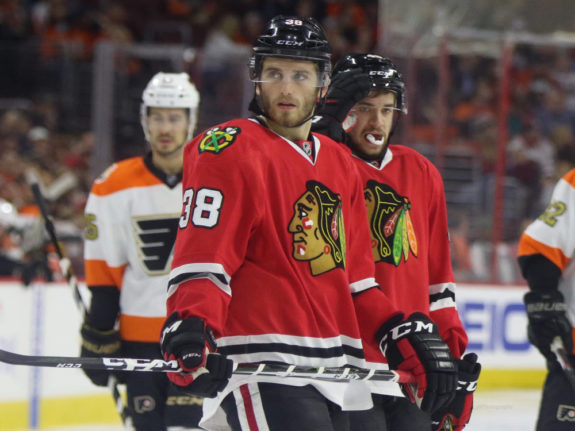
But there are significant questions regarding the defense and the backup goaltending situation for the Blackhawks. If they are going to regain their dominant edge over the Central Division and Western Conference, backup goaltending and defense need to be appreciable over the long and grueling 82-game season.
More specifically, Gustav Forsling and Forsberg will need to step up during the 2017-18 season.
Backup Goaltending Must Be Solid
Needless to say, Corey Crawford is undeniably and unequivocally the starting goaltender for the Blackhawks. Crawford has been a rock in net for Chicago over his career.
As the starting goalie, he has started at least 55 games in each season (excluding 2012-13 due to the lockout), has a career win/loss record of 214-115 and a career save percentage of .918. Along the way, injuries have occurred, but so has exceptional backup goaltending.
When Crawford wasn’t playing at peak form or he simply just needed rest, he and the Blackhawks were able to rely on Scott Darling, Ray Emery, and Antti Raanta to take the load off his shoulders. And the backup goaltending Crawford has had, while sometimes getting lost among other noteworthy stories, simply cannot be overstated.
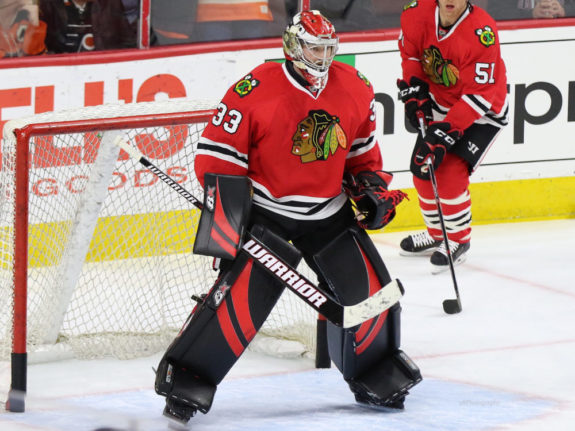
During the Blackhawks’ historic 2012-13 season, many fans were actively calling for Emery to replace Crawford as the starting goaltender—he had 17 wins, one loss and a save percentage of .922 during the regular season. His exceptional and consistent level of play also earned him Vezina Trophy votes during the 2012-13 NHL Awards.
And then there is fan-favorite, Darling. Growing up in Lemont, Illinois, validating and solidifying his seemingly interminable and inspirational journey to the NHL and receiving a backup position for a team he rooted for as a youngster was certainly enough to generate fans.
And the attachment to Darling only intensified during the most recent Stanley Cup championship for the Blackhawks.
Back in 2014-15, Darling was forced to come up big in the playoffs, as he replaced Crawford in Game 1 and started in Games 3-6 against the Predators. As the backup for the Blackhawks, Darling had a career win/loss record of 39-17 with a save percentage of .923 during the regular season.
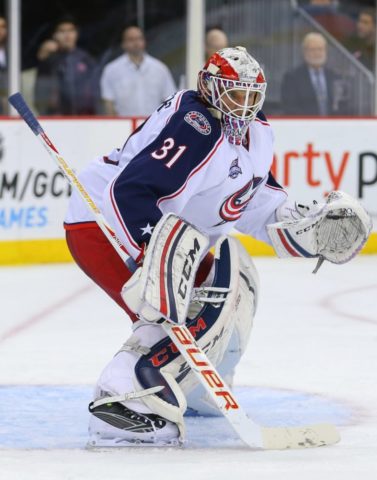
With Darling now suiting up for the Carolina Hurricanes, the backup goaltending position looks as if it will be awarded to Forsberg. With only 10 games of NHL experience, a win/loss record of 1-8 and a save percentage of .879, obvious concerns are warranted. But in his first preseason game with the Blackhawks, he looked good. Really good.
Although it’s only preseason, competition is still notably high. Players are fighting for their NHL lives, so to speak, and will do whatever they can to earn the trust from their respective organizations.
In his first preseason game against the team that traded him away, Forsberg made 38 saves on 40 shots attempted by the Columbus Blue Jackets. Moving well from side to side and displaying confidence in the crease is a huge boost for him as well as the Blackhawks.
But if he is indeed awarded the backup role, and it certainly looks that way, he will need to fill the void left by Darling. If and when Crawford needs rest, Forsberg needs to show he is ready for NHL competition. A solid, reliable backup goaltender is vital over the course of an 82-game regular season, and Forsberg needs to step up.
Defense Remains a Question
After a notable offseason in which the Blackhawks lost experienced defensemen Niklas Hjalmarsson, Trevor van Riemsdyk, Brian Campbell and Johnny Oduya, the defense is looking much thinner than in years past. Needless to say, but still worth noting, the Hawks’ defense has been something to marvel at over their three Stanley Cup championships in a span of six seasons.
In their most recent Stanley Cup championship, the Blackhawks were able to shut down top scorers with pairings of Duncan Keith/Brent Seabrook and Oduya/Hjalmarsson. And when you take the time to think about those two pairings, it’s actually scary and it will bring you down a joyous memory lane.
But, as noted above, the defense looks much more delicate, which is obviously seen through the PTO contract to Cody Franson, and that provides a necessary concern for the Blackhawks moving forward.
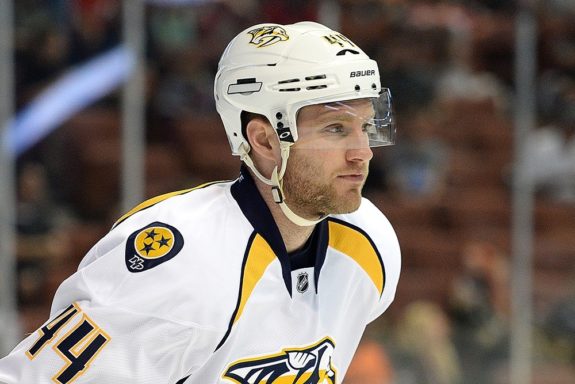
For a defense that looks somewhat depleted when compared to previous seasons, it provides a great opportunity for Forsling to insert himself into the lineup, and it looks like he’s going to get his chance to become a regular starter.
During the 2016-17 season, Forsling played in 38 games and posted a plus/minus of plus-3. He has the opportunity to make the roster and continue his development during the fast-approaching 2017-18 season. Keith and Seabrook need help, and Forsling will need to help solidify the defense and take pressure off of Crawford.